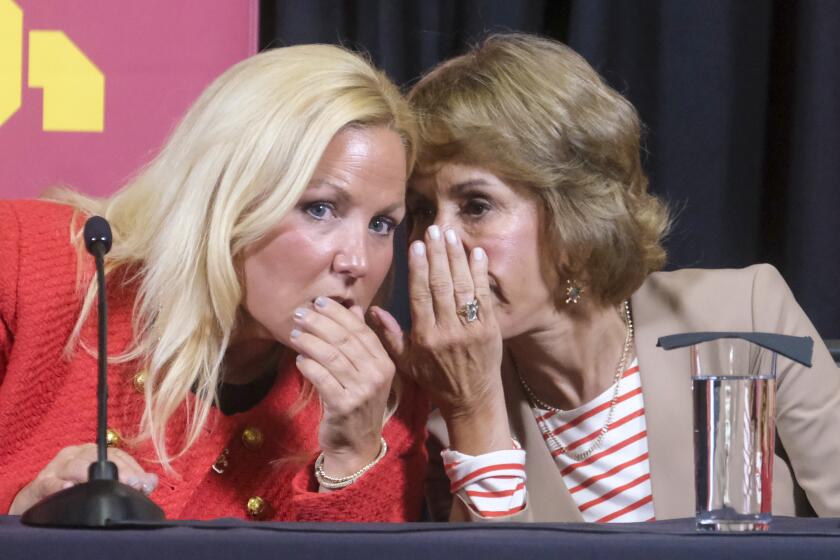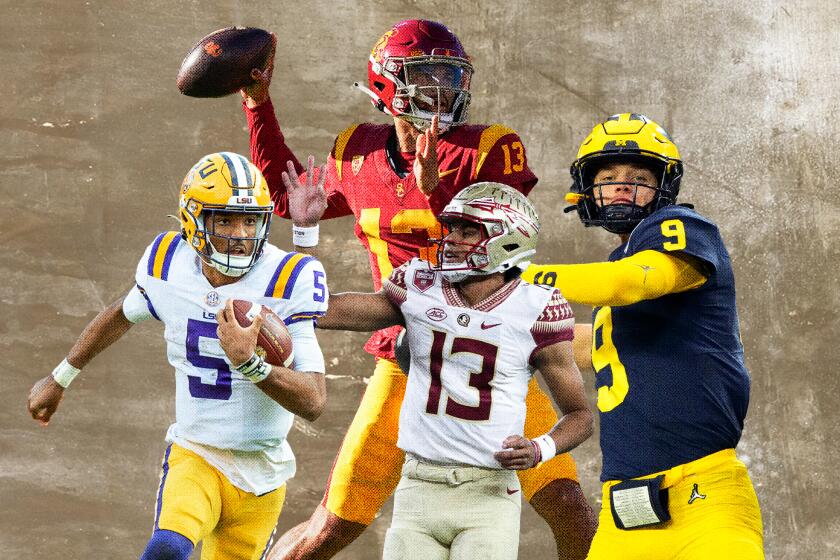Q&A: Chris Petersen explains why he always trusted new USC athletic director Jennifer Cohen
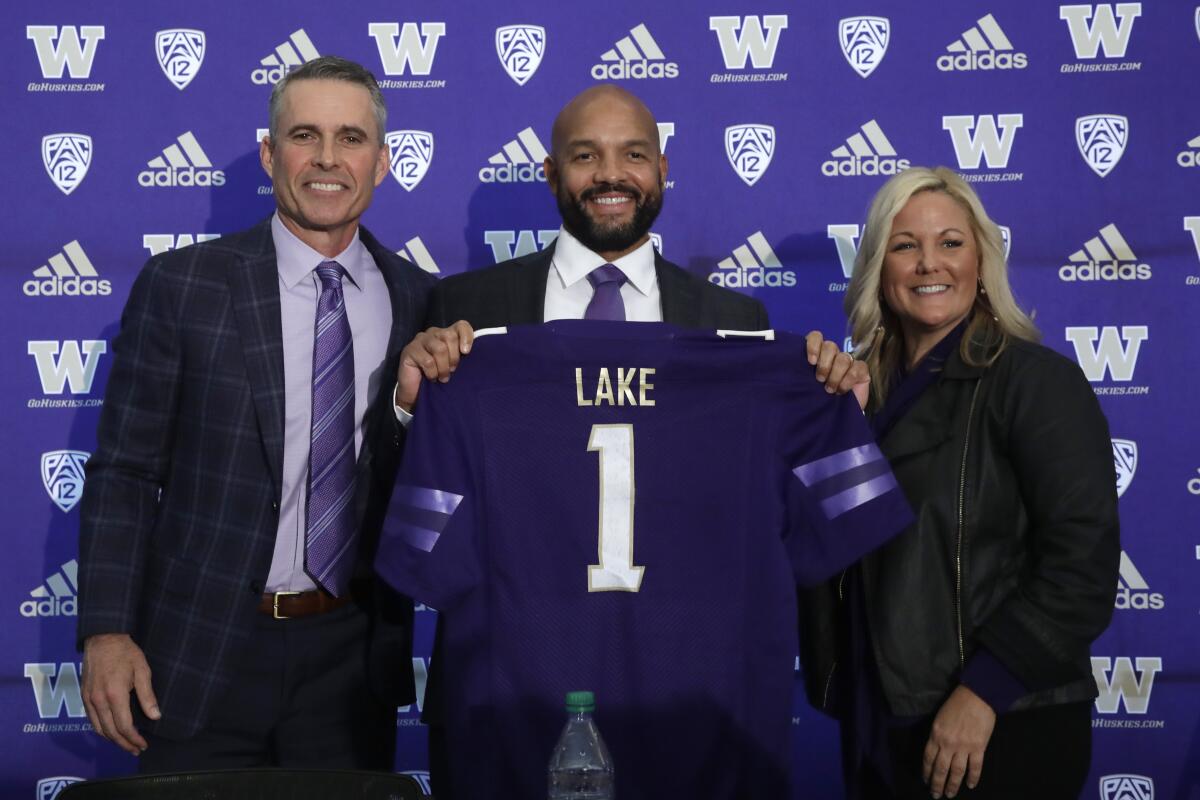
- Share via
When Boise State takes the field against Washington on Saturday in Seattle, Chris Petersen will conveniently be in Los Angeles at the Fox studio working in his role as an analyst.
“I get to be Switzerland,” Petersen joked.
It’s a busy week for Petersen, who made his name as Boise State’s coach for eight years before taking the Washington job in 2014. But he made time for a conversation to discuss USC’s new athletic director, Jennifer Cohen, his former boss.
Cohen became Washington’s athletic director in 2016, two years into Petersen’s tenure. By that time, the two already were close confidants. Their relationship actually began in 2014, when Petersen finally was taking calls from suitors at bigger programs. USC called and paid a visit to Boise, but Washington ended up being the perfect match — and Cohen deserved some credit for building the connection.
Jennifer Cohen’s success as USC athletic director will mostly hinge on working with Lincoln Riley to ensure USC becomes a college football juggernaut.
That’s where we’ll start our interview with Petersen:
J. Brady McCollough: When did you meet Cohen?
Chris Petersen: I didn’t meet her until Scott [Woodward, Washington’s previous athletic director] and her came over to Boise to talk about this job. I wasn’t really sure who she was, or what she did [laughs]. I knew who Scott was, but I liked her when we were discussing me coming up to Washington, and when we decided to do it and came, a day or two later she showed up and I said, “What do you do?” And she said, “Well, I’m here to help you.” And I’m thinking, “Do what?” Because I’d never had anybody like that, a sport administrator that was really in it with you all the time. I just didn’t have the framework. We didn’t have that at Boise, the luxury of that. If I needed something, I asked the AD.
Quickly, very quickly, I could tell that she is on it. And she understands football, she understands athletics, she understands the whole situation, and she really understood the dynamic of running a team and an organization. So she was just a really great thought partner to figure a lot of things out. We just solved a lot of problems together.
JBM: It’s almost like Cohen’s role represented your introduction to a “Power Five” life.
CP: It’s really nice because it’s a different angle. You have so many people surrounding you, your staff, some administrators on your staff, but she could think on a higher level. It was really helpful.
JBM: Going back, how did you become sold on Washington, and what was Cohen’s impact there?
CP: So I had talked to a few people over the years. Not many. But a few. And the one thing I did understand is how important the people you work with are. Not just on your staff, but the leadership of the university, really from the president, certainly from the AD, and people who are going to support you. I understood how important that was, that you’re completely aligned. I think a lot of times people are not aligned. They take jobs when they’re not aligned and you can hardly get out of the gate correctly because both sides don’t get all the answers they need when they’re going to work together. And it was really important talking to Scott and Jen that I fit this place at Washington. That was probably the biggest hurdle.
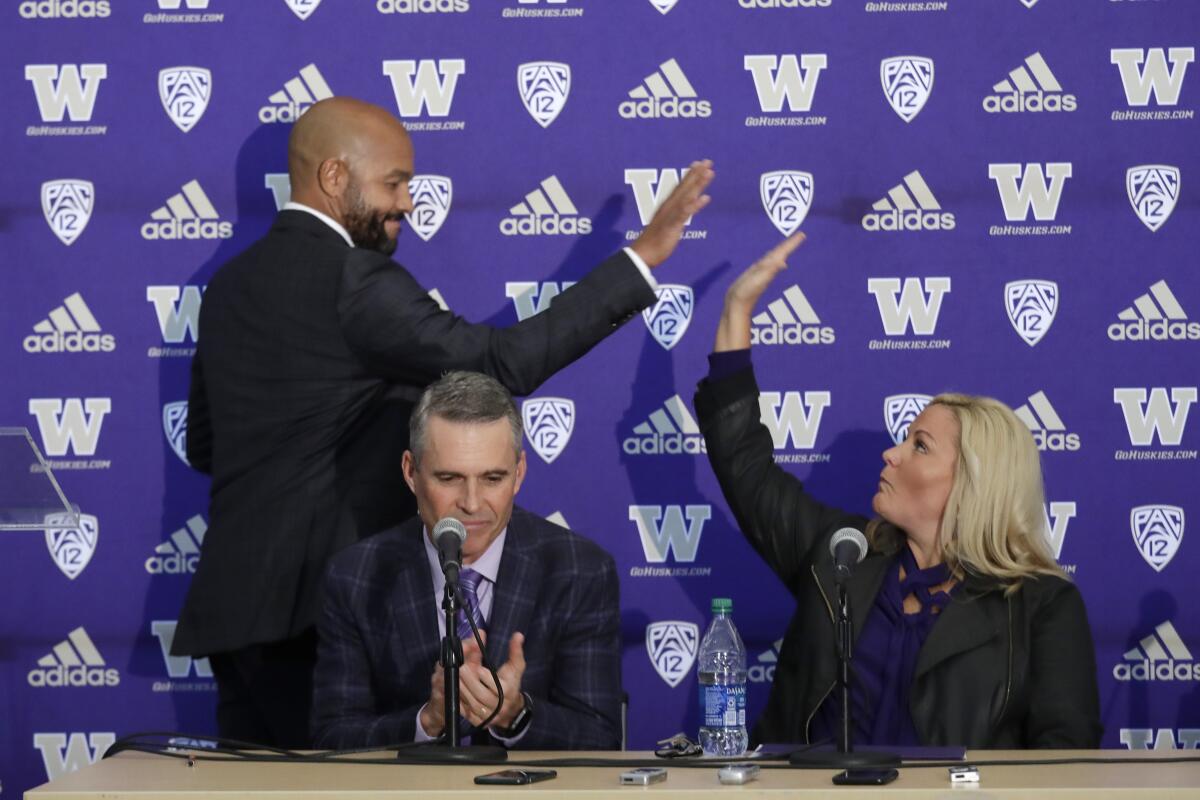
I’d been at Boise a long time, 14 years as an assistant and head coach. I think there’s a shelf life that every place can have. Sometimes you feel you need another challenge to continue to grow, but I wasn’t leaving, because I knew how good of a job I had at Boise, unless I felt like we were completely in alignment. And I felt that 100% at the University of Washington talking to Jen and Scott.
JBM: What were her strengths as the lead football administrator?
CP: She had so much great institutional knowledge of how things worked there, who was influential, who would be important, that was a big thing. And then just her perspective on things was so spot on that many times I hadn’t thought about that.
The other thing that jumped out to me really quickly [laughs], one of her superpowers is reading people, figuring out personalities. She could tell me, you are really going to connect with this person, or I don’t think this person is going to be someone you will fit with very well. She was so good at that. Even when she became the AD, if I was hiring somebody in our building, I didn’t care what the position was, I always tried to see if Jen had 15 minutes to talk to this person. And she had no background on this person, but I always wanted to get her take on what she thought. She was really good when it comes to what people are all about.
JBM: She grew up a Husky fan and obviously loved the program. How did you see that play out day to day?
CP: She just had a lot of institutional knowledge and had been there for a long time and worked her way up. I don’t know, I just liked her whole mentality. She just kind of had that “roll your sleeves up and let’s go to work, let’s do hard work and solve tough problems.” I just think Jen is super self aware, she is really good with reading the room, and she’s got tremendous courage. She’s going to do the right thing.
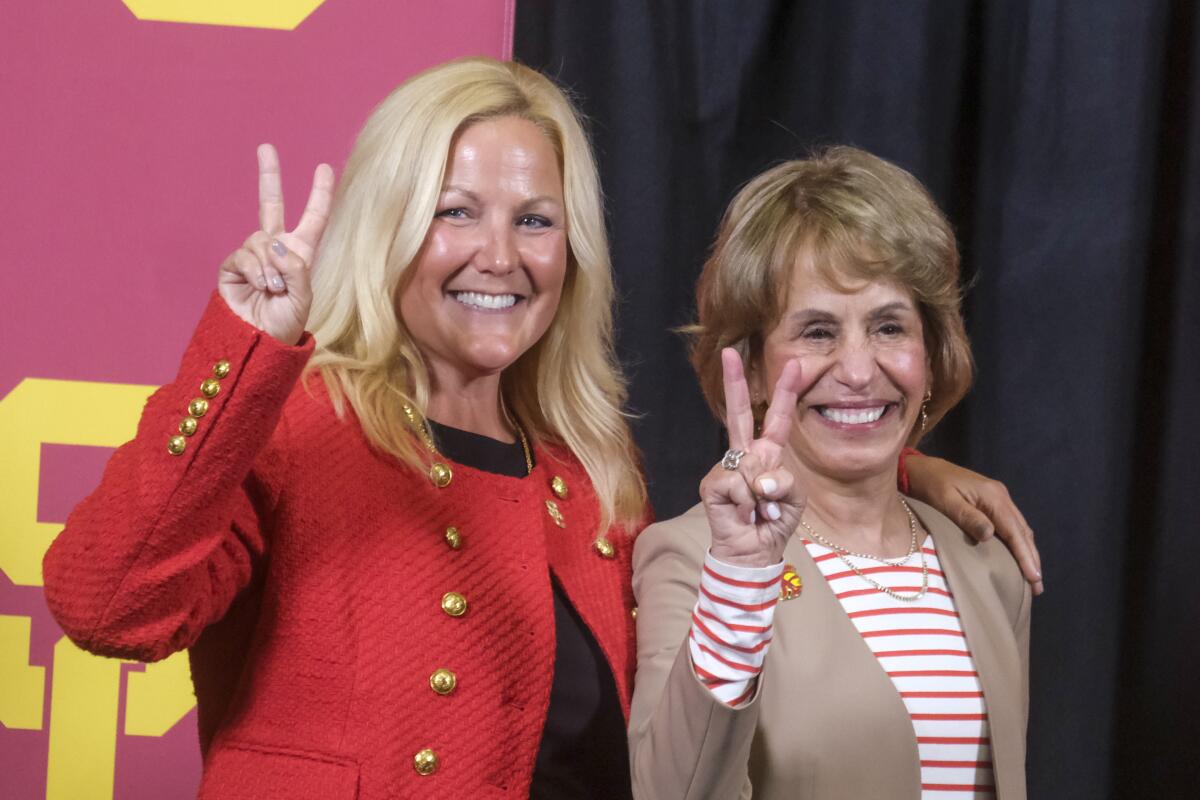
JBM: How do you mean?
CP: These jobs are political jobs. Being a head football coach unfortunately is a political job. Back in the day we never signed up thinking it would be, but there’s lots of politics that go with all the stakeholders, and certainly at the AD position, it is too. I’ve just seen her time and time again, she’s going to do the right thing, and trust her judgment and conscience. A lot of times it’s easier to not do the right thing just to keep a lot of people happy, but that doesn’t move your organization forward.
From the seven years she was here, she was totally prepared to be the AD. It was completely obvious in my opinion. She was just really good at knowing what to do and the landscape and being an expert in this arena. Now, it is different once you sit in that chair, so there is a learning curve. But to watch her grow and watch college athletics and certainly football take 180-degree turns that it has taken in the last three to four years, to watch her adapt, adjust, learn, struggle like we all do in this environment right now … she has a really good sense, of, OK, this is the best course of action.
Because there’s really not a lot of good answers where we are in college athletics, with football and seeing all the realignment, it’s just a lot of years of lack of leadership at the very top of the NCAA, a lot of money involved, and it becomes, you’re just trying to survive, every man for himself and what’s best for our program. It’s not about the greater good. I think that’s where a lot of people have frustrations, but she sees the whole board, she really does. She knows where the pieces need to be moved.
Which teams will stand out during the 2023 college football season. J. Brady McCollough makes his picks and predictions for every Power 5 conference game.
JBM: Were you surprised she decided to leave for USC?
CP: Like I said, I’ve been through a lot of this stuff. Every situation can have a shelf life. It hits everybody differently. So I don’t think this is a negative for Washington. I think about what a fabulous job she did here in a really difficult situation and how she moved this athletic program ahead and the culture she built inside, how the coaches and everybody were in it together, feeling supportive and cared for, all those things. She’s going to move on, and everybody’s job at Washington is to find the next really good piece to build on where Jen got everybody.
I think USC is super lucky to have her. And I’ve said this, there’s a lot of politics on campus and a lot of players involved, but if people will get out of the way and let her do her job in that department down there, she’s going to make USC better, there’s no question about it.
More to Read
Go beyond the scoreboard
Get the latest on L.A.'s teams in the daily Sports Report newsletter.
You may occasionally receive promotional content from the Los Angeles Times.

